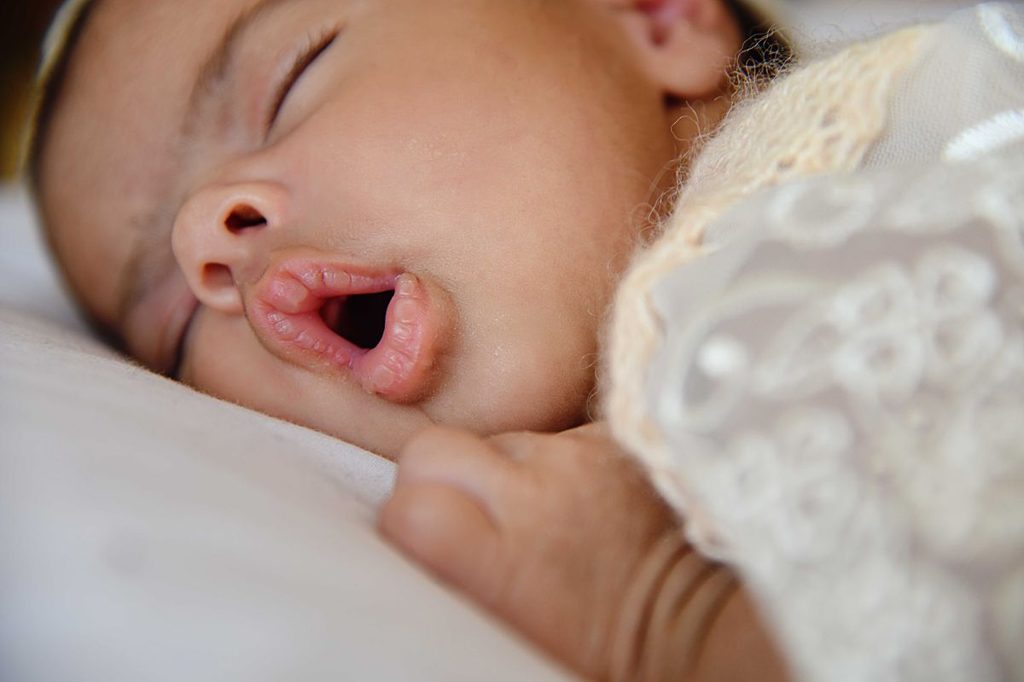Nothing is sweeter than an adorable sleeping baby, but if your baby sleeps with their mouth open, it can indicate a potential issue. Your baby may look cute as they slumber with their mouth open, but mouth breathing in babies can be a warning sign for certain health issues like sleep apnea. If your baby sleeps with their mouth open, you’ll want to address it with your baby’s pediatrician.
There are a few potential causes of mouth breathing in babies and different ways to resolve each. It’s important to get the correct information about mouth breathing in babies and to bring it to your pediatrician’s attention. You can then take any necessary steps so you and your baby can both sleep more soundly.
What causes mouth breathing in babies?

There are a few different reasons a baby may breathe through their mouth while they are sleeping. Some are temporary reasons that aren’t red flags while other causes mean you’ll want to follow up with your pediatrician.
Babies don’t naturally breathe through their mouths while asleep. If there is an obstruction to a newborn baby’s nose, they would be more likely to wake up rather than switch to mouth breathing because of their facial anatomy at that stage of development.
First, if your baby has a stuffed-up nose from a cold or allergies, they won’t have another option but to breathe through the mouth until the nose opens back up. Usually, a baby will go right back to sleep with a closed mouth once the congestion clears. Sometimes, mouth breathing becomes a habit after a cold.
Another reason for mouth breathing is a condition called sleep apnea, in which the upper airway is obstructed. Mouth breathing during sleep is one symptom of sleep apnea in addition to snoring, pauses in breathing during sleep, and restless sleep. While sleep apnea in adults usually causes them to be tired during the day and to gain weight, in children it more often causes them to have behavioral problems and to get enlarged tonsils or adenoids. The enlarged tonsils or adenoids may also be the cause of sleep apnea.
Risk factors for pediatric obstructive sleep apnea include obesity, Down syndrome, abnormalities in the skull or face, cerebral palsy, sickle cell disease, neuromuscular disease, a history of low birth weight, and a family history of obstructive sleep apnea. Your baby may have also been born with a deviated septum, which is an abnormality in the cartilage and bone that separates the nostrils. This can lead to trouble breathing through the nose when asleep.
Mouth breathing and tongue-tie

Although we often hear about tongue-tie and how it can affect an infant’s ability to breastfeed, it can also impact their sleep. According to Dr, Rosalba Courtney, “tongue tie can be easily overlooked,” as a cause of mouth breathing,” and “the signs are not obvious unless you specifically look for them.” She also noted that this can cause the tongue to sit lower in the mouth, making it difficult to reach the roof of the mouth, often resulting in that open mouth position you may see with your baby.
If your baby is struggling to latch and breastfeed and is sleeping with their mouth open, speak to your pediatrician about your concerns. The good news is that the procedure to correct a tongue tie is relatively simple.
When to look for mouth breathing

Babies won’t typically start mouth breathing until they reach the age of 3 or 4 months because that’s when they develop the reflex to breathe through their mouths. While you’ll be more likely to notice your infant’s mouth breathing as they sleep, it can be a habit that continues throughout their waking hours as well. In addition to some of the reasons we’ve talked about already, the shape of your child’s jaw could also be causing them to breathe through their mouth as can a deviated septum, which sometimes occurs during the labor process.
If you’ve noticed your baby is mouth breathing often and not stopping even after any congestion or illness clears up you should visit your pediatrician. They may refer you to a pediatric dentist or other professional who will be able to give you the guidance and expertise needed to help stop your baby’s mouth breathing.
How can I stop my baby from mouth breathing while sleeping?

Stopping a baby from sleeping with an open mouth depends on the cause of the mouth breathing. If it’s temporary congestion from a cold, you can use a cool-mist humidifier in their room overnight. You can also use a bulb syringe or NoseFrida to remove mucus from the nose before bedtime. Another home remedy is sitting with the baby in a steamy bathroom before bed to help alleviate nasal congestion.
For a condition like sleep apnea or a deviated septum, you’ll need to follow up with your doctor for the next steps. For sleep apnea, the doctor may prescribe medication, a CPAP or BPAP machine, or the removal of the tonsils or adenoids. For a deviated septum, a doctor might recommend surgery.
Is mouth breathing in babies something to worry about?

As a parent, we worry about pretty much everything connected to our babies. If the mouth breathing lasts for just a few days because of congestion, mouth breathing shouldn’t be a problem. However, long-term overnight mouth breathing can cause many problems and should be corrected.
“Children who mouth breathe typically do not sleep well, causing them to be tired during the day,” dentist Dr. Yosh Jefferson said. Poor sleep may also affect growth, behavior, facial development, and dental development. They may get “long face syndrome” with a narrow jaw. It can even cause poor oxygen concentration in the bloodstream, which can cause medical issues, including high blood pressure, heart problems, and sleep apnea.
How do I know if my baby is breathing properly?

Being a parent can be stressful, especially if you notice any changes in how your baby is breathing. In addition to certain factors that can cause your baby to sleep with their mouth open, there are also signs to look for to indicate if your baby is breathing properly. If you notice a bluish tint around their mouth, it could be a sign of low oxygen. You should consult a medical professional immediately if this happens.
Nanit also suggests that if your baby is flaring their nostrils significantly while breathing, this could be an indicator that something is wrong and they are working harder to breathe. A change in posture or noises could also indicate that something is affecting their breathing. Monitor your child regularly and make a note of how they breathe and behave so you have a baseline to compare if you suspect there’s something wrong.
If your baby is habitually mouth breathing, bring it up with your pediatrician sooner rather than later. Make an appointment to discuss the issue with your pediatrician right away. Not getting quality sleep can seriously hurt your baby’s development at this important stage of their life. Other potential effects, like heart problems and high blood pressure, can develop because of prolonged mouth breathing as a baby. Observe your baby while they sleep to see if there are other issues, such as snoring or breathing pause,s so you can tell the doctor. Once the doctor has the information on your baby’s mouth breathing patterns, your pediatrician can best advise you on the next steps to determine a diagnosis and treatment plan.





